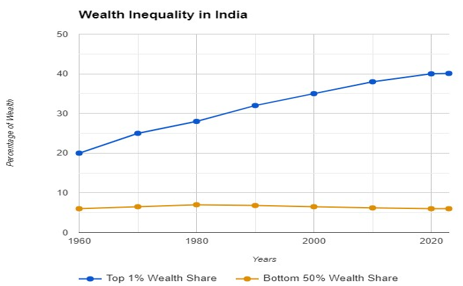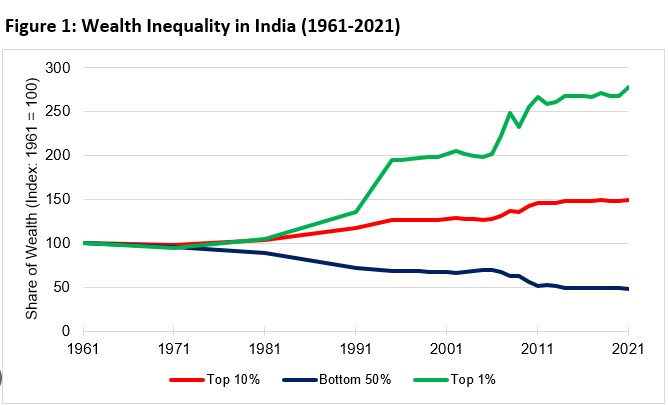Context:
A recent study by the World Inequality Lab found that income and wealth inequality in India has reached record heights.
Key findings:
• Top earners hold a significant share: The top 1% of India’s population now controls a staggering 40.1% of the country’s wealth and 22.6% of its total income.
• Sharp rise in recent years: The concentration of wealth in the hands of the top 1% has grown particularly fast since the 2010s.

• Global comparison: India’s top 1% income share surpasses those of South Africa, Brazil, and even the United States, placing it among the most unequal countries in the world.
• Unequal wealth distribution: Even within the top 1%, wealth is highly concentrated, meaning a small number of ultra-wealthy individuals hold a large portion of the total wealth.
• Historical context:
- The share of national income allocated to the top 10 per cent declined from 37 per cent in 1951 to 30 per cent by 1982.
- From the early 1990s onwards, there was a substantial increase in the share of national income held by the top 10 per cent.
- This trend continued over the next three decades, with the top 10 per cent nearly reaching 60 per cent of the national income in recent years.
- In contrast, the bottom 50 per cent of the population received only 15 per cent of India’s national income in the fiscal year 2022-23.

• Policy implications: The study suggests that India’s tax system might not be effectively addressing wealth inequality. It recommends to:
- Restructuring the tax code, adding that a levy of a “super tax” of 2 per cent on the net wealth of the wealthiest families would yield 0.5 per cent of national income in revenues and create space for investments.
- Increasing public investment in social programs like education and healthcare.
World Inequality Lab (WIL)
It is an international research organisation focused on the study of inequality and public policies that promote social, economic and environmental justice. It was founded in 2017 by a team of economists, including Thomas Piketty, Emmanuel Saez, and Gabriel Zucman. The lab is affiliated with the Paris School of Economics and is based in Paris, France.

